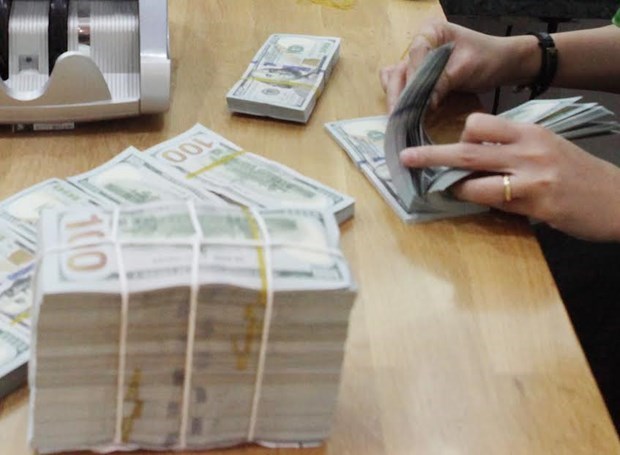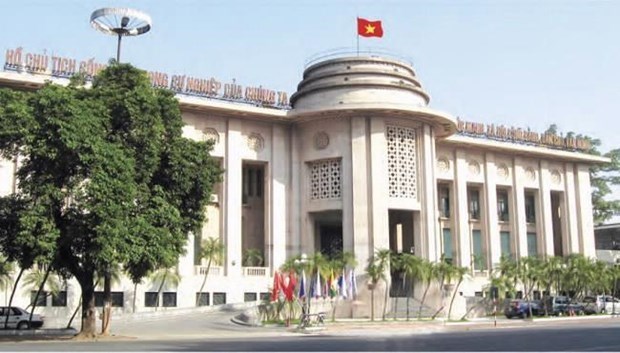 |
|
Vietnam would be exposed to such risks as discrimination in tax imposition and goods evaluation in the US market after the US added Vietnam in the list.
|
They made the affirmation following the US Treasury Department’s labelling of Vietnam as a currency manipulator.
According to Associate Prof. Dinh Trong Thinh, a senior lecturer at the Academy of Finance, Vietnam would be exposed to such risks as discrimination in tax imposition and goods evaluation in the US market after the US added Vietnam in the list.
Maintaining close cooperation with US
One month ago, the US held a forum for its experts and businesses, and those from Vietnam and certain countries, where most of the delegates shared the view that Vietnam has not manipulated its currency.
The American Chamber of Commerce (Amcham) in Hanoi said in a statement that the US and Vietnam have developed a healthy commercial relationship that has created jobs, tax revenues, and opportunities for both countries over the past year.
“Currency manipulation has not been an issue for our membership, and any potential action in the final days of the Trump administration to harm Vietnam’s economy with punitive tariffs will damage the close partnership the two countries have developed over many years,” said Adam Sitkoff, Executive Director of AmCham in Hanoi.
He added tariffs or other retaliatory measures could have broad commercial implications for companies and investors in Vietnam.
Sitkoff said the recent growth of Vietnam’s export to the US was driven primarily by the relocation of the supply chain from China to Vietnam.
“We believe in a cooperative approach and prefer that the US government prioritises its efforts on more pressing issues facing our business community. Examples include policies on digital trade and broadcast, pharmaceutical imports, intellectual property rights, customs and tax procedures, and more.”
By opening up its market to more American goods and services, Vietnam can reduce its growing trade surplus with the United States in a manner that benefits both countries, he said.
Regarding the US Department of Treasury’s announcement of a report on Macroeconomic and Foreign Exchange Policies of Major Trading Partners, in which Vietnam and Switzerland were listed as currency manipulators, at a meeting of the Government’s standing members on December 18, Prime Minister Nguyen Xuan Phuc said that under the instruction of him and other Vietnamese government leaders, Vietnamese ministries and agencies have actively coordinated with US partners, and reaped fruitful outcomes, especially in trade and investment.
The two sides have worked together to deal with difficulties and obstacles to maintain a stable trade relationship, towards harmonious, sustainable and win-win trade, the PM said.
The spokesperson of the Foreign Ministry and the State Bank of Vietnam have answered reporters’ questions related to the issue, clarifying Vietnam’s viewpoint on monetary regulating policy, which aims to stabilise the macro-economy but not to devaluate the currency to create trade advantages.
The Prime Minister has assigned ministries and agencies to continue coordinating closely with the US side to maintain the momentum of the bilateral partnership and make it stronger in the future, bringing practical benefits to peoples and businesses of both countries.
US Treasury Department’s evaluation criteria need to be reviewed
Truong Van Phuoc, a member of the advisory panel to the Prime Minister and former acting Chairman of the National Financial Supervisory Commission, said there are several points in the Treasury’s report that need to be clarified.
Regarding the large trade surplus with the US, Phuoc, who is also a former head of the Foreign Exchange Management Department at the State Bank of Vietnam (SBV), said the country’s trade activities in the past three decades reflect its transition process to a market-oriented economy, with the distinguishing features of cheap labour costs, labour-intensive growth, inflows of foreign investment, and exploitation of natural resources resulting in cheap exports. Therefore, it is unreasonable to say that Vietnam uses foreign exchange to make its products even more of a bargain.
With a material current account surplus, Vietnam has enjoyed a trade surplus in recent years, but the actual amount is not significant, at around 5-10 billion USD each year and over 20 billion USD in 2020 in particular. As most of the country’s current account comes from remittances, foreign exchange is not the element that makes the current account surplus exceed 2 percent of GDP.
Touching on interventions in the foreign exchange market, Vietnam does not allow foreign currencies to be used as a means of payment, which means foreign investors and exporters must exchange their money into Vietnam dong to conduct business activities.
For this reason, it is compulsory for the SBV to purchase foreign currencies, since it facilitates business activities of people in Vietnam, Phuoc stressed.
Another issue is that the US perceives that Vietnam has bought foreign currencies to set the value of the Vietnam dong below its real value.
Phuoc said Vietnam should explain to the US more clearly about its currency’s parity with the US dollar.
This parity largely depends on the inflation difference between Vietnam and its major trading partners, especially the US, he elaborated, adding that annual inflation in Vietnam has averaged 4 percent in recent years, with 5 percent the highest, while exchange rate growth has been maintained at 1-1.5 percent, or 2 percent in certain years. Compared to inflation, the exchange rate has increased at a much slower pace.
There is no such thing as currency devaluation, but the Vietnam dong’s current value is even higher than its real value.
“These are factors indicating that Vietnam has not manipulated its currency,” Phuoc stated.
Vietnam’s exchange rate management within monetary policy
Vietnam does not manipulate its currency, the State Bank of Vietnam (SBV) affirmed on December 17, one day after the US Treasury Department announced the Macroeconomic and Foreign Exchange Policies of Major Trading Partners of the US report, which designated Vietnam and Switzerland as money manipulators.
The country’s monetary policies have been carried out to concretise a consistent target of controlling inflation rate and ensure macroeconomic stability, the bank said, adding it does not seek unfair trade advantages.
Trade surplus with the US, and material current account surplus are the results of many factors, including those related to distinguished features of the Vietnamese economy.
The bank’s purchase of foreign currencies aims to ensure the smooth operation of foreign currency markets in the context of abundant supply, contributing to stabilising the macro-economy and building up State foreign currency reserves, which remain low compared to regional countries, so as to enhance national financial-monetary security.
Phuoc believed the US will listen to the Vietnamese side, and trade and foreign exchange experts so as to see that Vietnam has no intention to devalue its dong.
Through dialogues and debates, Vietnam has received support from renowned US economists, who have a deeper view in the story.
The SBV will join hands with competent ministries and sectors to work on issues of the US’s concern based on the spirit of cooperation and mutual benefits towards building harmonised and sustainable trade relations.
It will continue current monetary policy to curb inflation rate, stabilise the macroeconomy, support economic growth in a rational manner, while taking a flexible foreign exchange policy based on macro-economic balances and market developments.
Chief Executive Officer of HSBC Vietnam Tim Evans said SBV provided two-way support when it lowered the USD selling rate in March to meet demands as when foreign exchange market appeared to be under pressure during the social distancing period, and lower the USD buying rate in November when dollar supply in the market turned ample again.
Unlike previous years when the dong usually depreciated against the greenback, in 2020, the dong has even appreciated slightly by about 0.2 percent compared to the dollar, while there has been almost no year-end pressure for the foreign exchange market, he said.
“We have grounds to expect the exchange rates in 2021 to continue to be managed flexibly,” Evans said. “Notably, with the foreign exchange reserves surging to record high, the SBV has enough tools and resources to stabilise the exchange rates to meet market supply and demand. However, there are still challenges that need to be observed and monitored such as the vaccination roadmap for COVID-19, the recovery of the global supply chain, not to mention 2021 being a transition year for the US presidency.”
“Against the context of unpredictable fluctuations of exchange rates, businesses, especially in export-import area and businesses with foreign loans in foreign currencies need to actively use hedging tools, especially through derivatives such as term contracts, interest rate swap contracts, etc. to ensure their proactiveness in cash flow planning and profit balancing,” he noted./.VNA

VN central bank responds to US labelling Vietnam as currency manipulator
The State Bank of Vietnam (SBV) said on December 17 that its management of exchange rate in recent years, within the general framework of monetary policy,

US’s branding of Vietnam as money manipulator biased: Experts
The US Treasury Department’s labelling of Vietnam as a currency manipulator is biased, as it is only based on US standards and lacks suitable consideration as well as recommendations from international organisations, according to experts.